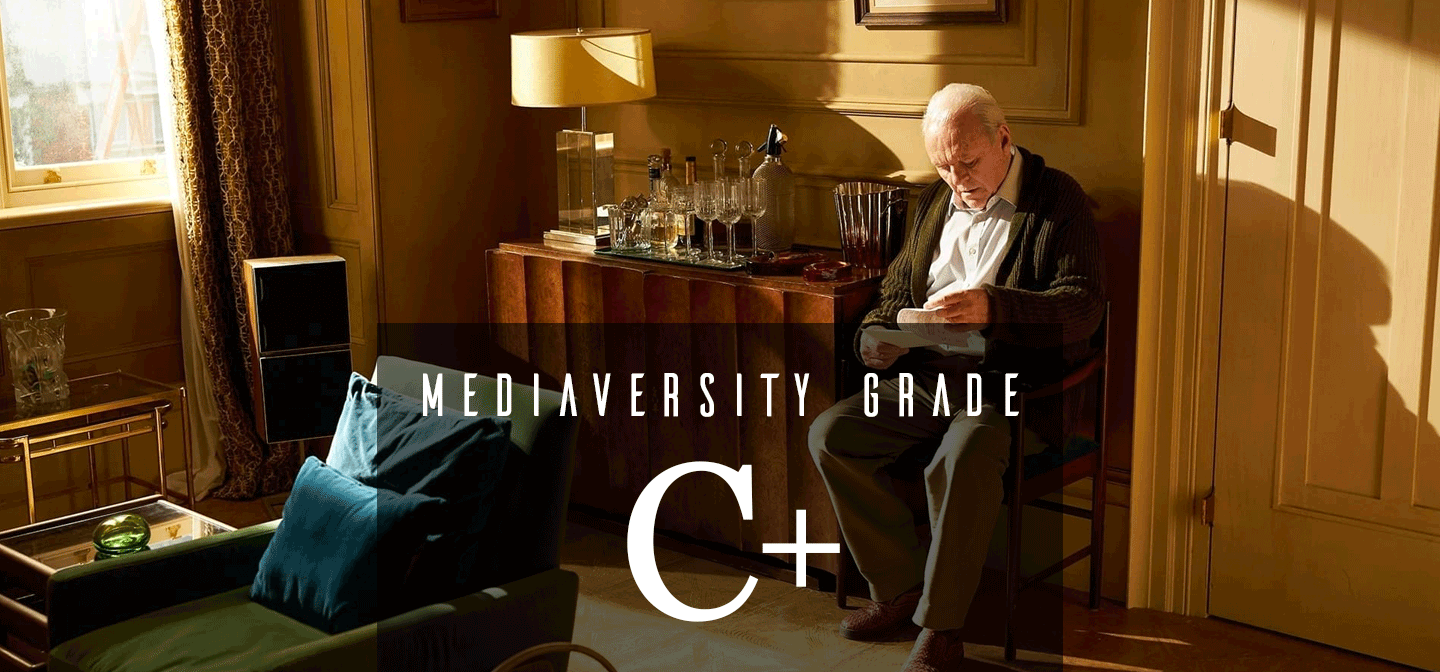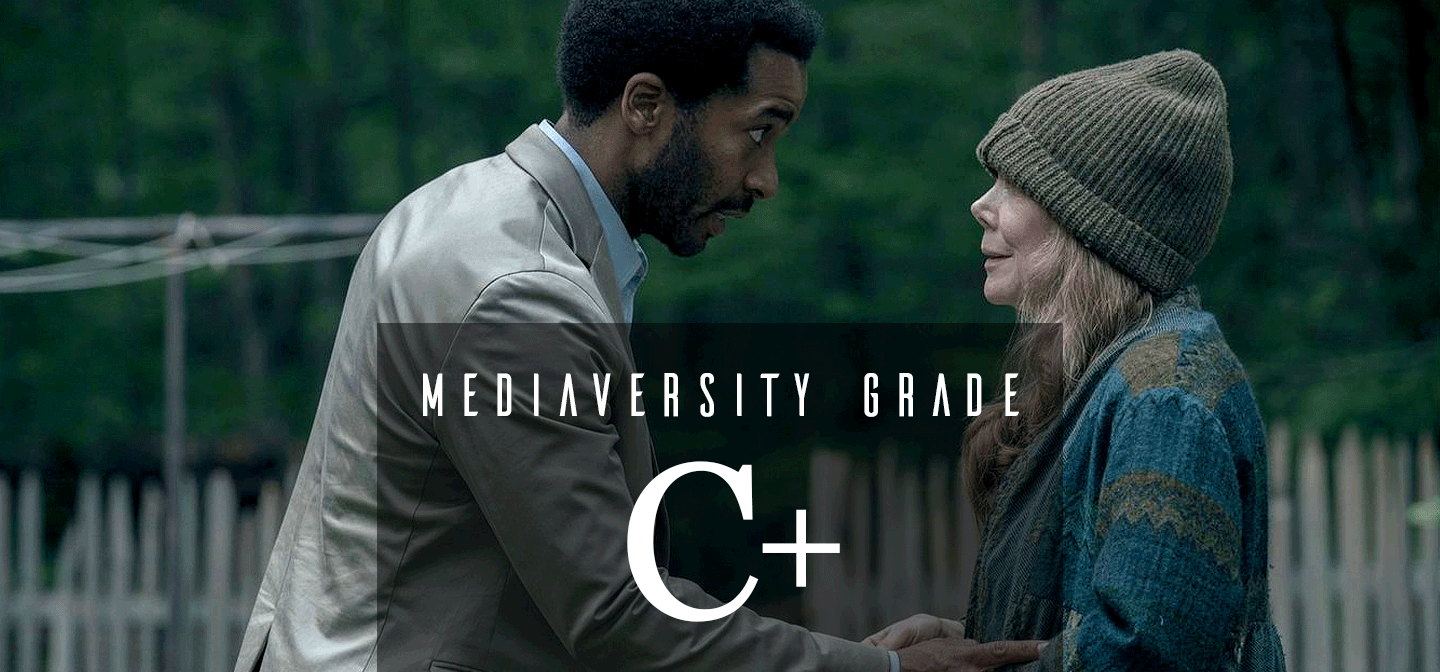The Father
“The Father presents the rare perspective of someone experiencing memory loss but fails to go beyond the view of a white man with financial means.”
Title: The Father (2020)
Directors: Florian Zeller 👨🏼🇫🇷
Writers: Screenplay by Florian Zeller 👨🏼🇫🇷 and Christopher Hampton 👨🏼🇬🇧 based on the play by Florian Zeller 👨🏼🇫🇷
Reviewed by Dana 👩🏼🇺🇸♿
Technical: 4/5
Through the eyes of its main character, Anthony (Anthony Hopkins), The Father begins by lulling its audience into a sense of comfort. The flat where the bulk of the story plays out feels posh and charming, the white paint more elegant than sterile, providing a baseline of calm before embarking on a subtle campaign of terror.
It might be a different experience entirely for some viewers—maybe they’re in on the plot, spoiled by Twitter or Wikipedia. Maybe they’ve lived a life of dull clarity and sanity devoid of mental health assessments or neurological exams. But for anyone who’s ever been in the position of defending their own ability to distinguish truth from reality, who’s been gaslit or psychoanalyzed, what unfolds is an adventure in cognitive dissonance. Even knowing at the outset that dementia plays a leading role in the film, the mind-bending is engineered so meticulously that anyone prone to self-doubt can’t help but wonder if the problem is their own perception.
The Father serves as a reminder that movies aren’t always about a story. Some exist purely as a journey. In The Father, Anthony Hopkins reminds us why he’s considered a master of his craft, embodying the anguish of losing one’s grip on reality and inviting us all along for the devastating ride.
Gender: 3.25/5
Does it pass the Bechdel Test? YES
By its nature, with a reliance on inconsistency to put viewers in the fracturing mind of its lead character, The Father has no space for backstory. To give too much insight into characters would defeat its quest to sow confusion. In that context, Anne (Olivia Colman) feels remarkably three-dimensional.
Some of that depth stems from Olivia Colman’s skill at layering a performance like a French pastry, delicate and precise, and one that would be an inedible, wet mess in the hands of a lesser talent. There’s no one thing to point to, not the subtle inflection in her voice or the way pain and fondness seem to settle on her face or the way her spine seems to go rigid when she takes on that tone we’ve come to associate with her role as Queen Elizabeth on The Crown. But Colman suffuses the character with subtle emotions that give Anne—daughter, caretaker, woman—agency. Viewers can feel her conflict as her husband (Rufus Sewell) presses her to put Anthony in a nursing home so that she can live her own life; the deep hurt punches through the screen when Anthony castigates her for her desperate, patient attempts to care for him.
The role, first embodied by Isabelle Gélinas in the stage play from which Florian Zeller based his film, isn’t all that substantial, and it’s hard to know how much of what shines through of Anne’s life can be credited to the actor, versus the script or the direction. Still, it’s Colman at her best, wringing every ounce of humanity from the fabric of Anne.
Race: 1.5/5
The Father’s limited perspective (and perhaps its origins as a play) keeps its call sheet to a minimum, with only seven actors with any dialogue. The only non-white character is Anthony’s neurologist, Dr. Sarai (Ayesha Dharker, who is Indian born in Mumbai). She has the least to do of any of them and only speaks a handful of lines.
Given the overrepresentation of people of color in the caregiving profession, having three white British health aides does seem a bit like whitewashing, or at least a clear failure at authentic representation. The past year has put a sharp focus on how much of the role of caring for aging and sick populations in both the United States and Britain falls to immigrants and people of color. The work is often thankless, subjecting carers to the volatile moods of people who are terrified and angry at being robbed of their autonomy and mental faculties; the pay is grossly inadequate and the job subject to abrupt termination. And while the addition of a stock character trope wouldn’t have added anything to the story or to the cause of representation, the all-white trio feels inauthentic at best.
Bonus for Disability: +1.00
Bonus for Age: +.50
For anyone who has watched an aging loved one go through the stages of dementia, from limited recall on through a debilitating state of abject confusion, The Father hurts. When my grandmother died suddenly in a car accident, only a year or so after her Alzheimer’s diagnosis, my mother referred to the incident as a “gift.” I was eight at the time and couldn’t understand what it meant to spare loved ones the anguish of watching someone forget their lives, piece by piece.
When the last survivor of my parents’ parents’ generation died, almost a year to the day before I watched Anthony Hopkins step into his waning mind, I had experienced being forgotten. I understood the mixed pain of losing a loved one and sparing them a worse fate. The great-uncle who I’d watched sing along a few years ago to Irish folk songs, knowing every word despite having forgotten who I was, stayed with me through The Father in a way I could not have anticipated: For the first time, I could make sense of some of what he did and said. Our society is quick to write off its elders, even more so when they’ve deteriorated in wealth or health. As painful as it is to witness, and as confusing as it is to be dragged into, The Father gives voice to the reality we all fear with a deeply empathetic sense of humanity.
Mediaversity Grade: C+ 3.42/5
The Father is a work of cinematic brilliance, but like so many in that category, the concept of cinema has been crafted by and for a limited audience with limited experience. Though it represents a rarely-discussed perspective of someone experiencing memory loss, it fails to go beyond the view of a white man with financial means. For women, particularly women of color and disabled women, memory loss is a gateway to a new hell—one where Anthony’s worst days seem enviable by comparison. A glimpse into the reality of aging and losing cognition as a non-white, non-male, non-able person is almost inconceivable as a work of art, and the few examples we see, in films like I Care a Lot (2021) or Ludi (2021), tend to sideline such characters in favor of a younger, more “palatable” protagonist.
Aging is a terror that awaits the luckiest among us, and The Father presents a gut-wrenching picture of what it wants us to believe is a worst-case scenario. What’s even more chilling is that it’s not: It’s merely the glossiest, best-cast, most whitewashed version.




